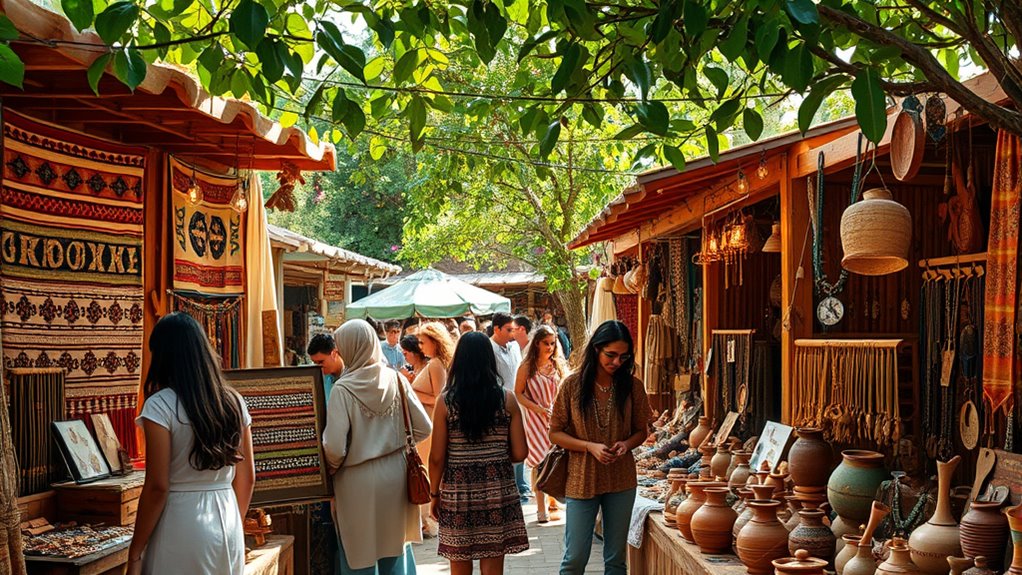By supporting boho community marketplaces focused on fair trade, you help artisans earn fair wages, preserve cultural traditions, and promote sustainable practices. These platforms ensure transparency about product origins and highlight artisans’ stories, making your purchases more meaningful. Your choices foster community resilience and protect unique craftsmanship. Continue discovering how responsible shopping can make a real difference for artisans and their communities—there’s more to explore about creating positive impact through fair trade.
Key Takeaways
- Boho marketplaces promote fair trade practices, ensuring artisans receive fair wages and work in safe, sustainable conditions.
- Supporting artisans preserves cultural heritage and traditional craftsmanship through community-driven marketplace initiatives.
- Transparent platforms share artisan stories and sourcing details, fostering trust and ethical consumer choices.
- Fair trade and eco-friendly practices in boho markets enhance social equity, environmental sustainability, and community resilience.
- These marketplaces strengthen local economies, empower artisans, and contribute to global sustainable development goals.
The Significance of Ethical and Sustainable Practices in Boho Marketplaces
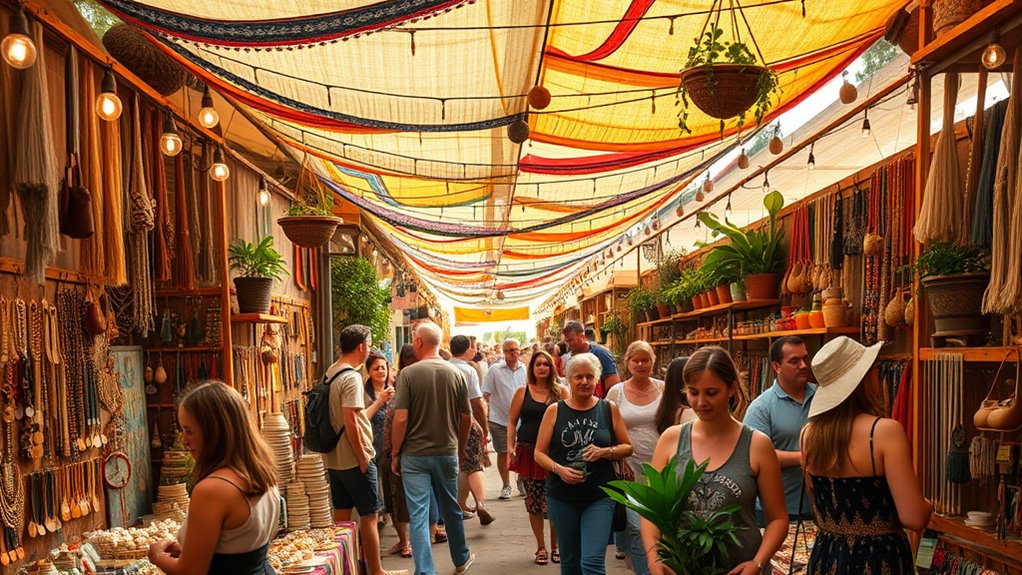
Ethical and sustainable practices are at the heart of boho marketplaces, shaping how products are sourced and created. Fair trade plays a crucial role by ensuring artisans receive fair wages and work in safe conditions. When you shop in these markets, you’re supporting initiatives that verify products meet strict social, economic, and environmental standards, often through organizations like the Fair Trade Federation. This commitment helps preserve cultural heritage and traditional craftsmanship from underserved communities worldwide. Many boho vendors also prioritize eco-friendly practices, using recycled materials and sustainable packaging to minimize environmental impact. By choosing fair trade and sustainable options, you contribute to a more responsible consumer culture that values mindful production, supports artisans, and promotes a healthier planet. Incorporating ethical practices into your purchasing decisions helps foster a more equitable and sustainable global marketplace. Recognizing craftsmanship as a vital element underscores the importance of maintaining traditional skills and techniques in today’s market. Additionally, emphasizing transparency in sourcing encourages consumers to make informed decisions that support ethical supply chains and fair labor practices.
How Artisans Benefit From Fair Trade and Community Support
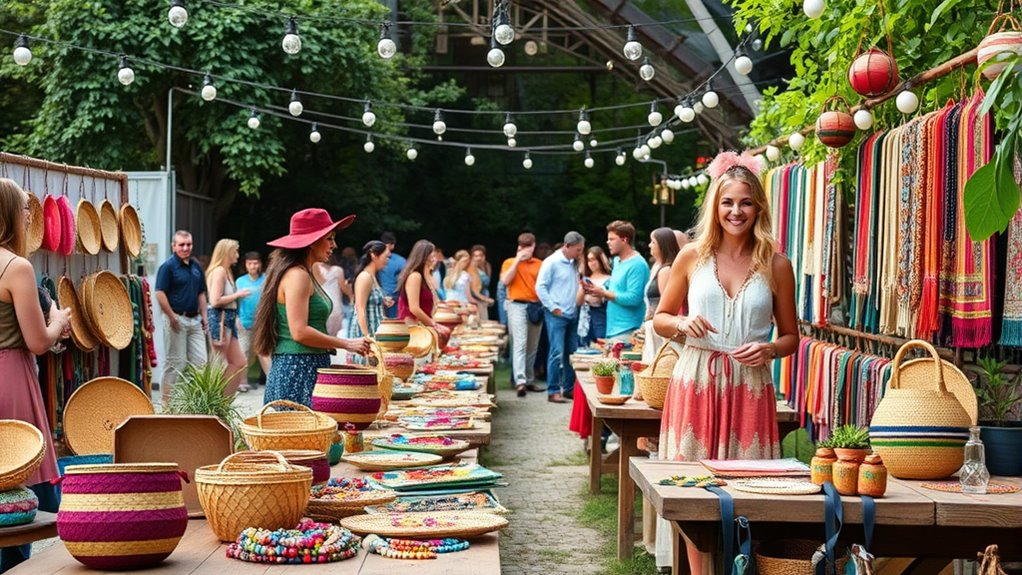
When you support fair trade and community-driven marketplaces, you’re directly helping artisans enjoy fair wages, stable income, and better working conditions. By choosing ethically sourced products, you guarantee artisans are compensated equitably, which supports their economic sustainability. Community support also expands their access to global markets, allowing artisans to grow their businesses and reach new customers. Fair trade practices help preserve traditional craftsmanship and cultural heritage, empowering artisans to maintain independence. Collaborations with fair trade organizations provide training, resources, and ethical sourcing, enhancing product quality and marketability. Your support enables artisans to invest in their communities, sustain their artisanal skills, and improve their livelihoods. Additionally, AI tools can assist artisans in designing and marketing their products more effectively, opening new avenues for creativity and sales. Implementing advanced market analysis can further help artisans identify emerging trends and demand, boosting their competitiveness. Embracing cultural intelligence in these initiatives can further enhance cross-cultural understanding and foster respectful collaborations. Implementing effective fraud prevention tools can also help protect artisans from financial scams and ensure secure transactions. Incorporating textile art techniques into their offerings can boost artisans’ creative expression and market appeal. Ultimately, you play a crucial role in fostering fair, sustainable, and culturally rich marketplaces.
Connecting Creators and Consumers Through Transparent Platforms
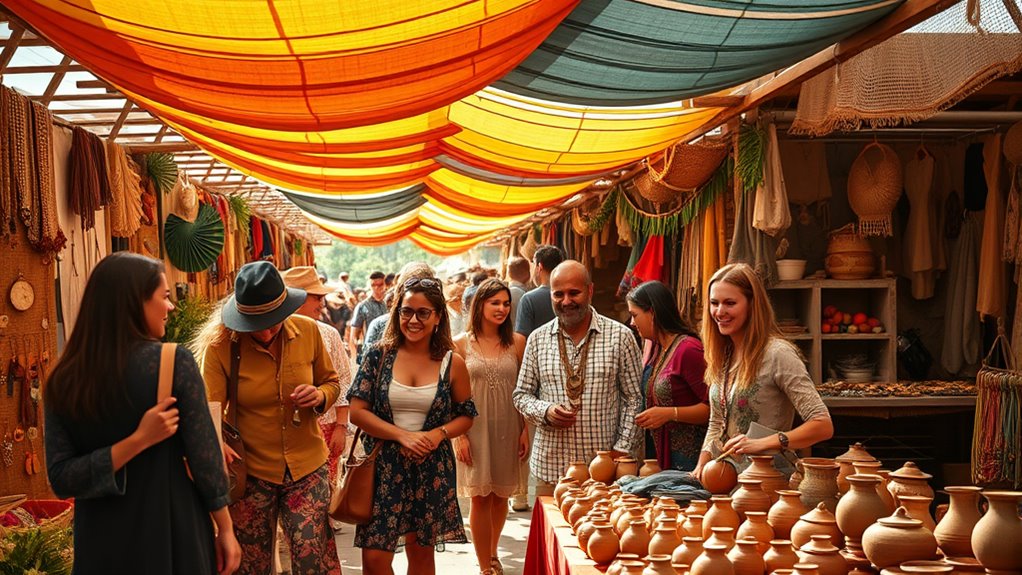
Transparent platforms like The Little Market connect you directly with artisans, ensuring you see the true origin of their products and understand the fair trade practices behind them. This transparency allows you to verify that items are ethically sourced, with fair wages and sustainable materials. These platforms often share detailed stories about artisans’ backgrounds, techniques, and sourcing methods, helping you build trust and make informed choices. Many operate as nonprofits or social enterprises, emphasizing community development and ethical standards. By documenting environmental impact and fair wages, they empower you to support small businesses aligned with your values. Showcasing artisan-made and ethically sourced products fosters a transparent supply chain, promoting sustainable growth and a deeper connection between creators and consumers. Additionally, highlighting cultural heritage helps preserve traditional crafts and practices for future generations. Incorporating advanced segmentation techniques in your engagement strategies can further personalize your support, ensuring your contributions have the most meaningful impact. Utilizing email marketing best practices can help you communicate these values effectively and reach like-minded audiences. Understanding product transparency ensures you are fully aware of the origins and ethical considerations behind each item you purchase. Being aware of Vetted – Nightingale Studio standards can further enhance your ability to support truly ethical and high-quality artisan products.
The Role of Cultural Preservation and Unique Craftsmanship
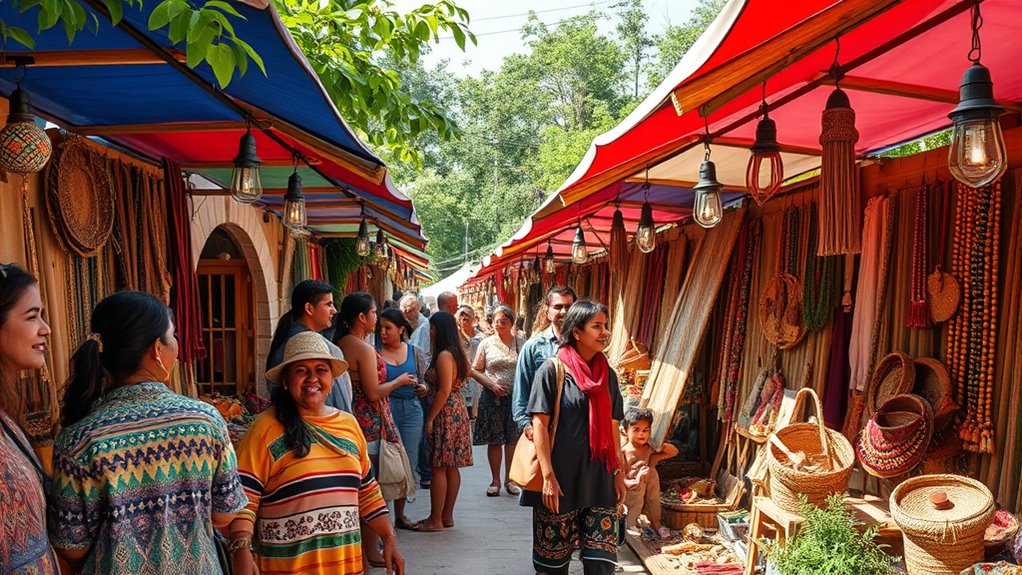
Cultural preservation plays a vital role in marketplaces that highlight traditional craftsmanship and artisanal techniques from around the world. When you make one purchase, you support artisans who keep indigenous skills alive, promoting cultural heritage. These marketplaces often collaborate directly with local creators, ensuring fair wages and ethical work environments. Unique craftsmanship reflects cultural symbols and methods, helping sustain traditional practices for future generations. Supporting these artisans not only preserves their community’s identity but also provides economic stability. By choosing authentic, handmade products, you contribute to safeguarding cultural diversity. Additionally, initiatives like Aboriginal art and storytelling help pass down traditional techniques and cultural narratives to new generations.
Building a Responsible and Inclusive Marketplace Ecosystem
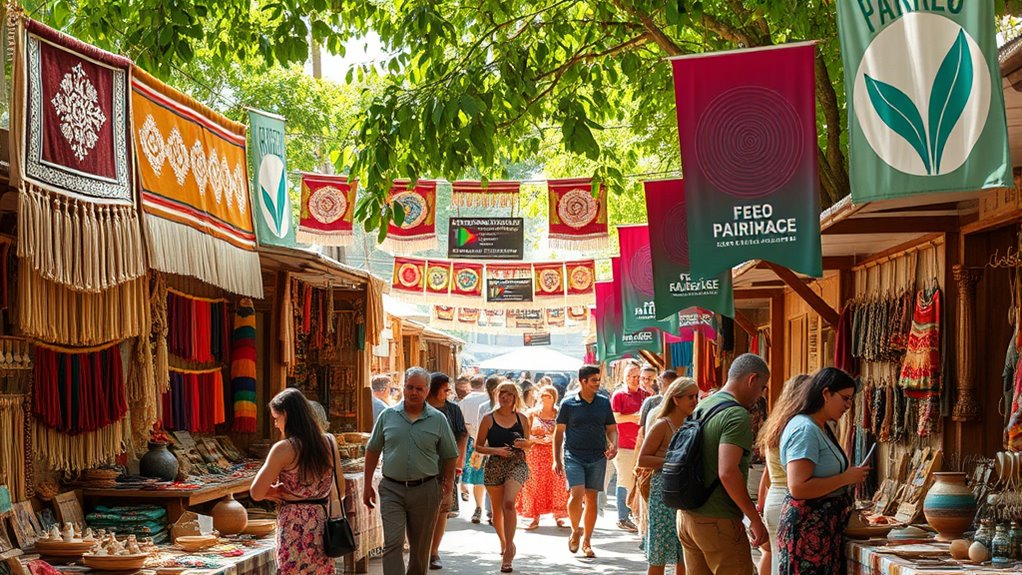
Building a responsible and inclusive marketplace ecosystem requires actively prioritizing ethically sourced, fair trade products that empower artisans from underserved communities worldwide. You should guarantee diverse vendor participation, giving small-scale creators and marginalized groups equal access to market opportunities. Transparency in supply chains and production practices builds consumer trust and encourages ethical purchasing decisions. Developing trust-based partnerships with artisan groups helps sustain long-term economic growth and cultural preservation. Incorporating community engagement initiatives and educational programs to raise awareness about fair trade principles and responsible consumption is essential. Promoting ethical sourcing and responsible production methods further enhances the integrity of the marketplace. Implementing cookie consent management ensures that user data and preferences are respected, fostering trust and transparency. Additionally, educating consumers about privacy policies and how their data is handled can strengthen confidence in the marketplace. Emphasizing marketplace transparency supports accountability and helps consumers make informed choices. This approach strengthens the community’s resilience and supports sustainable development worldwide.
Frequently Asked Questions
How Much Does It Cost to Be a Vendor at the Boho Market?
You’re curious about the cost to be a vendor at the Boho Market. Typically, booth fees range from $50 to $150 per market day, depending on the size and location. You might face extra costs like application or setup fees, and you’ll need to supply your own items like tents and signage. Check the market’s official details for exact fees and any discounts available for new or small vendors.
What Kind of Items Are Sold at a Boho Market?
Imagine walking into a treasure trove of handmade goodies, where every item whispers stories of artistry. You’ll find beautiful beaded jewelry, vintage bohemian clothes, and unique home decor like macramé wall hangings. Organic skincare products, felted toys, embroidered bags, and handcrafted pottery also fill the stalls. You get to support talented artisans while discovering one-of-a-kind pieces that perfectly match your free-spirited style.
Is Little Market a Fair Trade Company?
Yes, The Little Market is a fair trade company. You can trust that they partner directly with artisans and small producers worldwide, ensuring fair wages and sustainable practices. They’re committed to transparency, sharing stories about the artisans and sourcing methods. As a nonprofit, they focus on social impact, empowering underserved communities through ethical sourcing and fair labor standards, making your purchases meaningful and impactful.
Conclusion
By supporting boho community marketplaces, you become part of a vibrant tapestry of artisans and conscious consumers. Your choices help preserve cultural traditions and promote fair trade, turning each purchase into a thread that strengthens the fabric of ethical fashion. When you shop responsibly, you’re not just buying art—you’re weaving a future where creativity and sustainability flourish side by side. Together, you shape a marketplace where everyone’s voice adds color to the bigger picture.

